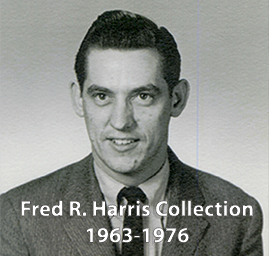Harris, Fred R., 32nd Chair of the Democratic National Committee (1969-1970); United States Senator from Oklahoma (1964-1973), 1930-
Biographical:
Fred R. Harris was born November 13, 1930, in Walters, Oklahoma, a small town in the southwestern part of the state. A 1952 Phi Beta Kappa graduate of the University of Oklahoma, he also received a law degree "with distinction" from that institution in 1954. In addition to practicing law in Lawton, Oklahoma, he served for eight years as a Democratic member of the Oklahoma State Senate. In 1963, changes on the state and national political scene impacted Harris's career. In January 1963, Robert S. Kerr, Oklahoma's senior U.S. senator, died. Oklahoma Governor J. Howard Edmondson resigned and had himself appointed to the Senate post, which he held until the next election in November 1964. That year, Harris was elected to fill the remaining two years of the term. He was reelected to a full term in 1966. As a member of the Select Committee on Small Business, as well as the Government Operations, Public Works, and Finance committees, Harris centered his legislative interests on human needs. Known for his ability to understand and work with opposing factions, he focused on improving the welfare system and increasing job opportunities for poor and unskilled workers. As chairman of the Subcommittee on Government Research, he introduced legislation to create a National Foundation for Social Sciences, designed to provide the social sciences with the visibility that the National Science Foundation gives to the natural and physical sciences. In 1965, the United States Junior Chamber of Commerce chose Harris as one of the ten outstanding young men in America. President Lyndon B. Johnson named him to the National Advisory Commission on Civil Disorders (Kerner Commission) in the summer of 1967. He drifted from the Johnson administration on the Vietnam War issue in 1968 and was vocal on urban affairs and race relations. In 1968, Hubert Humphrey came close to naming the Oklahoma senator as his vice-presidential running mate. The following year, Harris was elected chairman of the Democratic National Committee (DNC). While Harris's voting record in the Senate increased his standings with the national liberals, his popularity in Oklahoma declined. In 1971, Harris decided not to run for the Senate and instead announced he was seeking the Democratic nomination for president. Lack of money, however, forced him to bow out before the primaries. He again threw his name into the presidential ring in 1976 running a down-to-earth "new populist" campaign. The basic issue of his campaign was a "fairer distribution of wealth and income and power" through a majority coalition of economic self-interest put together across race, age, sex, and regional lines. He had a strong showing in the Iowa caucus, but following weak showings in the New Hampshire and Massachusetts primaries, Harris abandoned his presidential quest, left Washington D.C., and moved to New Mexico. Harris currently serves as a professor of political science at the University of New Mexico.
Found in 11 Collections and/or Records:
1969 Report on Conditions at Native American Boarding Schools, 1969-04-09
91st (1969-1971)
An Ongoing Conversation: Indian Affairs and Collaboration, 1966-07-02
89th (1965-1967)
Concerns Regarding Chilocco Indian School Budgeting, 1971-10-05
92nd (1971-1973)

Fred R. Harris Collection
Indian Affairs and Education: The Fred R. Harris Senatorial Papers, 1970-01-01 - 1970-12-31
91st Congress (1969-1971)
Petition for Proper Use of Education Funds, 1971-01-01 - 1971-12-31
92nd (1971-1973)
Response Regarding Chilocco Indian School Restoration, 1971-10-06
92nd (1971-1973)
Support for Special Scholarship Program for American Indian Law Students, 1970-04-02
91st Congress (1969-1971)
Supporting Seneca Indians: Resources and Assistance from Senator Fred Harris, 1971-02-22
92nd (1971-1973)
Title: Progress Update on Riverside Indian School Facilities, 1971-01-01 - 1971-12-31
92nd (1971-1973)
Filtered By
- Subject: Education X
Additional filters:
- Subject
- Education--United States; Indians of North America--Oklahoma 3
- Indians of North America--Education 2
- Indians of North America--Oklahoma; Education--United States 2
- Agriculture and state--United States 1
- American Indians 1
- Economic development--United States 1
- Education 1
- Education and state--United States 1
- Education, Higher--United States 1
- Education--United States 1
- Federal Indian policy--Education 1
- Housing--Law and legislation--United States 1
- Indians of North America--Claims 1
- Indians of North America--Government relations 1
- Indians of North America--Health and Hygiene--Law and legislation 1
- Indians of North America--Housing--Law and legislation--United States 1
- Indians of North America--Oklahoma DISAMBIGUATE ME! 1
- Indians of North America--Oklahoma; Education--United States; Indians of North America--Claims 1
- Indians of North America--Politics and government 1
- International relief--United States 1
- Mental health--United States 1
- Political campaigns--United States 1
- Public health--United States 1
- Science and state--United States 1
- Social security--Law and legislation--United States 1
- Vocational education--United States 1
